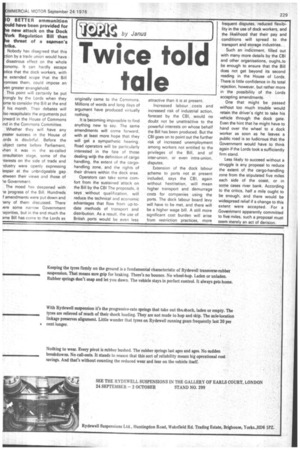wice told
Page 231

If you've noticed an error in this article please click here to report it so we can fix it.
tale
0 BETTER ammunition • uld have been provided for e new attack on the Dock ork Regulation Bill than e threat of a seamen's rike.
Nobody has disagreed that this tion by a trade union would have disastrous effect on the whole onomy. It can hardly escape ice that the dock workers, with e extended scope that the Bill romises them, could impose an en greater stranglehold.
This point will certainly be put rongly by the Lords when they me to consider the Bill at the end f his month. Their debates will 'so recapitulate the arguments put rward in the House of Commons nd in the Commons Committee.
Whether they will have any reater success in the House of .ords is doubtful. Before the ubject came before Parliament, vhen it was in the so-called :onsultation stage, some of the iterests on the side of trade and -idustry were openly expressing lespair at the unbridgeable , gap ietween their views and those of • Ime Government.
The mood has deepened with 'progress of the Bill. Hundreds f amendments were put down and any • of them discussed. There ,ere some narrow Government majorities, but in the end much the arne Bill has come to the Lords as originally came to the Commons. Millions of words and long days of argument have produced virtually nothing.
It is becoming impossible to find anything new to say. The same amendments will come forward, with at least more hope that they will get a sympathetic hearing. Road operators will be particularly interested in the fate of those dealing wit p the definition of cargo handling, the extent of the cargohandling zone, and the rights of their drivers within the dock area.
Operators can take some comfort from the sustained 'attack on the Bill by the CBI The proposals, it says . without qualification, will reduce the technical and economic advantages that flow from up-todate methods of transport and distribution. As a result, the use of British ports would be even less attractive than it is at present.
Increased labour costs and increased risk of industrial action, forecast by the CBI, would no doubt not be unattractive to the powerful interests on whose behalf the Bill has been produced. But the CBI goes on to point out the further risk of increased unemployment among workers not entitled to the privileges of the Bill, and of inter-union, or even intra-union, disputes.
Extension of the dock labour scheme to ports not at present included, says the CBI, again without hestitation, will mean higher transport and demurrage costs • for companies using the ports. The dock labour board levy will have to be met,. and there will be a higher wage bill. A stilt more significant cost burden will arise from restriction practices, more
frequent disputes, reduced flexibility in the use of dock workers, and the likelihood that their pay and conditions will spread to the transport and storage industries.
Such an indictment, filled out with many more details by the CBI and other organisations, ought,..to be enough to ensure that the Bill does not get beyond its second reading in the House of Lords. There is little confidence in Its total 'rejection, however, but rather more in the possibility of the Lords accepting amendments.
One that might be passed without too much trouble would retain the driver's right to take his vehicle through the dock gate. Even the hint that he might have to hand over the wheel to a dock worker as soon as he leaves a public road is so ludicrous that the Government would have to think again if the Lords took a sufficiently firm stand.
Less likely to succeed without a struggle is any proposal to reduce the extent of the cargo-handling zone from the stipulated five miles each side of the coast, or in some cases river bank. According to the critics, half a mile ought to be enough, and there would be widespread relief if a change to this extent were accepted. For a .Government apparently committed to five miles, such a proposal must seem merely an act of derision.




































































































































































































































































































































































